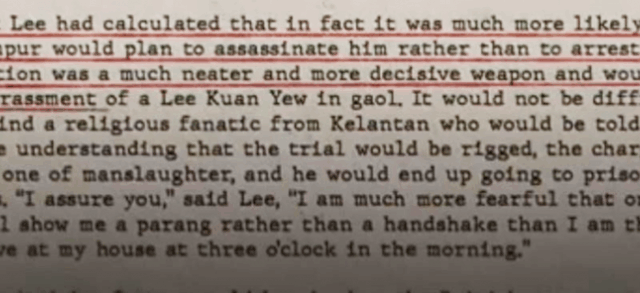British Envoy: “Lee Kuan Yew May be Assassinated” in his letter
british-envoy-lee-kuan-yew-may-be-assassinated-in-his-letter
#British #Envoy #Lee #Kuan #Yew #Assassinated #letter,
Singapore’s British Deputy High Commissioner Philip Moore’s 19th June 1965 letter to his government expressed the likelihood of former Singapore Premier Lee Kuan Yew being assassinated.

This was revealed in Channel News Asia’s (CNA) two-part docuseries, “Secrets, Betrayals: How Singapore’s Split from Malaysia Was Engineered Separation: Declassified.” These declassified documents provide a unique insight into the story of separation.
British diplomat Moore wrote: “I was very concerned by the way events were moving in the relationship between Singapore and Kuala Lumpur. As a result of Lee’s speech, the Malays felt cornered and would inevitably want to retaliate when placards appeared at the UMNO meeting in Kuala Lumpur, demanding the arrest of Lee Kuan Yew. I was concerned to know whether Lee thought he knew where he was going. You only arrest somebody and detain him if you have got no other solution. The Malay leaders are at the end of their wits.”
The two-part episode unveiled the intractable differences between warring political leaders, the outrage, anger, and threats of violence behind the failure of the Federation of Malaysia, and how that led to an unsalvageable situation, where only separation would prevent a bloodbath, CNA noted. “Some of this behaviour, some of this language is potentially so inflammatory that it’s causing concern certainly amongst the British because they thought they knew their man. By late June 1965, things had reached a very bad state. Much bad blood had flowed between the two sides. Lee had calculated that, in fact, it was much more likely that Kuala Lumpur would plan to assassinate (26th minute of the video)
him rather than arrest him. Assassination was a much neater and more decisive weapon. It would not leave the embarrassment of, and Lee said, “I am much more fearful that one day a Malay will show me a parang rather than a handshake than I am that the police will arrive at my house at 3:00 in the morning,” Moore added in his letter.
Speeches by Malaysian politicians, Moore added, called for Lee Kuan Yew’s death, inflaming the crowd.
CNA commentator said: “They were really going after him (Lee). The decisive factor would be whether the British were prepared to stand by and condone the use of the gun by Kuala Lumpur against Singapore. Lee did not think that the British would do this. Britain had military bases in Singapore.”
CNA producers spent months researching through “hundreds of letters” for little-known details about Singapore’s split with Malaysia in 1965. The team behind Separation: Declassified opens up on how they created the series.
Six decades later, those documents take centre stage in CNA’s two-part documentary, Separation: Declassified, which premiered this week.
CNA reported: “So much of history is presented through documents that have, in a way, been through a kind of filter,” said Mark Frost, co-author of Singapore: A Biography. “You get public speeches, you get official documents, carefully formulated to record events.
“Here you get these telegrams, confidential correspondence, which are all without that filter.”
The spark for the series came two years ago, when CNA producers were digging through declassified British files for a separate docuseries about Singapore’s reserves.
Freelance Writer M. Krishnamoorthy (https://imkrishna.wixsite.
